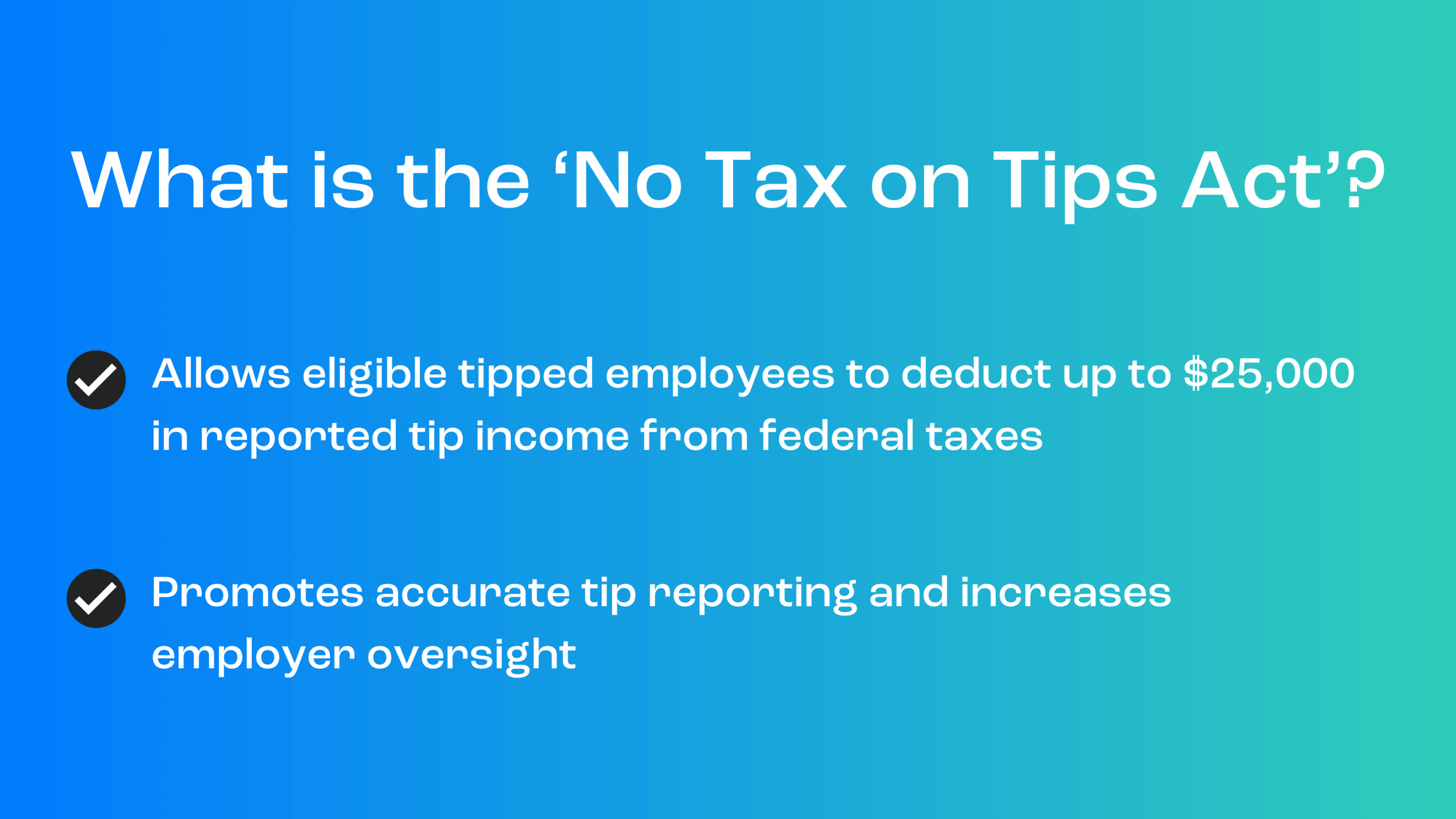
What the “No Tax on Tips Act” Means for Employers
A major legislative shift could change how payroll teams handle tipped wages. On May 20, 2025, the U.S. Senate unanimously passed the bipartisan “No Tax on Tips Act” (S.129), which proposes a federal income tax deduction of up to $25,000 for eligible tipped workers.
This law helps reduce taxes for tipped workers nationwide. If approved by the House, this bill could reshape payroll reporting requirements and influence how employers in hospitality, food service, and related industries handle tips.
Here’s what you need to know—and how to prepare.
What Is the No Tax on Tips Act?
The No Tax on Tips Act proposes a federal income tax deduction of up to $25,000 for reported cash tips by employees earning under $160,000 annually. The goal is to reduce the financial burden on tipped workers, who rely heavily on gratuities to make a living.
If enacted, this bill would:
- Allow eligible tipped employees to deduct a portion of their tip income
- Encourage more accurate and consistent tip reporting
- Increase employer responsibility to track and report tips correctly

Who’s Affected—and Why It Matters
Industries most impacted include:
- Restaurants, hospitality, and personal services that rely heavily on tipped wages
- Payroll and HR teams are responsible for accurate wage reporting and compliance
- Multi-state employers, who may already be juggling varying state and local tip laws
While the bill is positioned as a win for workers, some critics warn it could unintentionally incentivize employers to reduce base pay, shifting even more weight to customer tips. As always, any payroll change requires thoughtful planning and system flexibility.
Related Developments Payroll Teams Should Watch
To fully understand the shifting landscape, it’s helpful to look at the broader context of 2025 payroll regulations:
1) Social Security Wage Base Increase
The taxable wage base for Social Security has risen to $176,100 in 2025 (up from $168,600 in 2024). Both employees and employers must contribute 6.2% of earnings up to this threshold. Ensure your payroll system reflects this increase to avoid costly miscalculations.
2) State Minimum Wage Hikes
Several states raised their minimum wages in 2025, some surpassing $16 per hour:
- California: $16.50
- Connecticut: $16.35
- Illinois: $15.00
- Washington: $16.66
These increases affect not just base compensation, but also tip credit calculations in certain states.
3) Bigger Picture: Broader Tax Reform in Motion
The “No Tax on Tips Act” is part of a broader tax policy debate. Other proposed measures include overtime pay relief and updates to the SALT (state and local tax) deduction cap. While aimed at easing the tax burden for workers, these bills could significantly alter payroll planning and year-end tax strategies.
What Employers Should Do Now
While the “No Tax on Tips Act” still awaits a House vote, employers can prepare by:
- Reviewing how your payroll system tracks tipped income and taxable wages
- Educating employees on proper tip reporting procedures
- Consulting your payroll provider to ensure system flexibility for potential tax code changes
These steps set you up for compliance and build a more substantial, transparent payroll experience for your team.
Why Now Is the Time to Rethink Payroll Strategy
Whether or not the No Tax on Tips Act becomes law, it signals a significant shift in how compensation and compliance are evolving. Staying informed with new wage limits, state minimums, and potential tax reform is essential.
Looking for payroll tools that adapt to legislation?
Download our Payroll & HR Buyer’s Guide to find the right-fit solution for your business today and tomorrow.
Sources
- S. 129 – No Tips on Tax Act | Congress.gov
- Senate unexpectedly passes the No Tax on Tips Act in a unanimous vote | NBC News
- What to know about ‘no tax on tips,’ | PBS News











